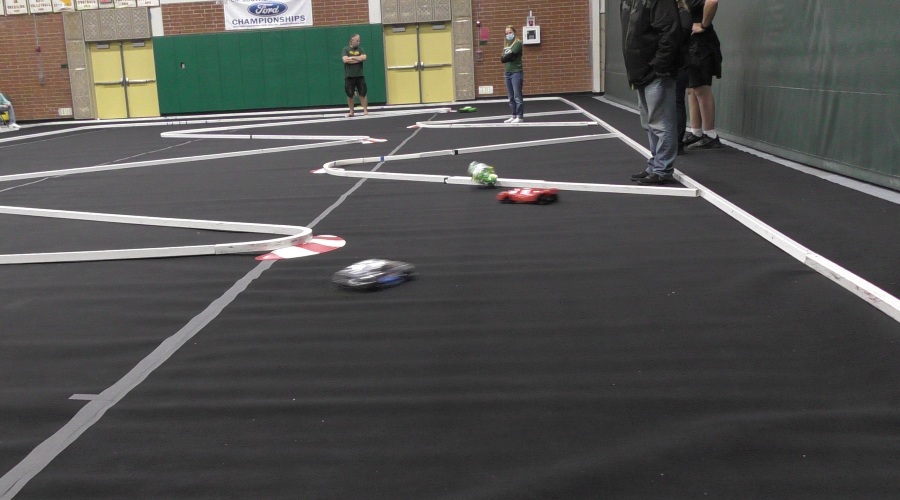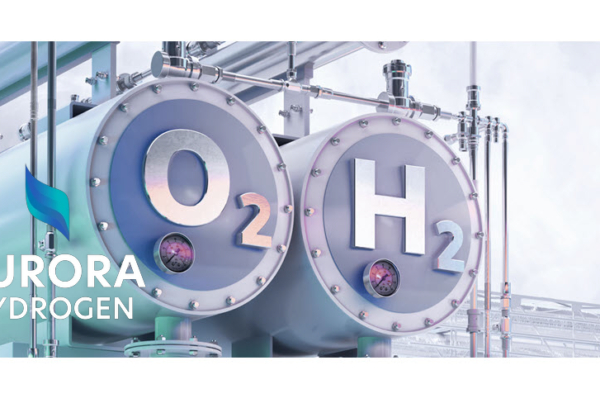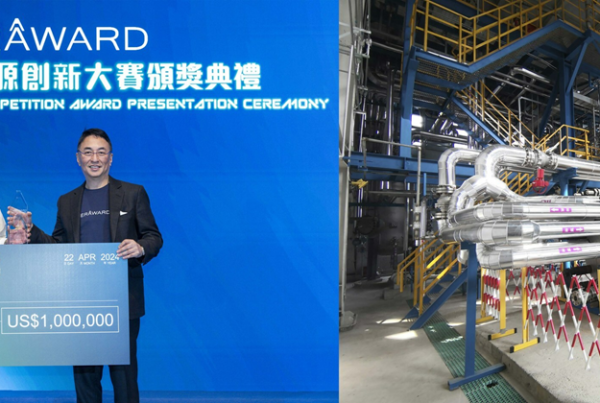
On 12.19.2021 the Horizon Educational H2GP racing season began in southern California when nine teams took to the track at Edison High School for the SoCal first practice round. Even though it was a practice session it was nonetheless an exciting time since for many of the participants it was the first time they were able to put their cars to the test.
However, the H2GP competition has it all: high-speed racing, crashes, the thrill of victory, the humbling moment of needing to go back to the drawing board, positive educational development, constructive competition, and, no less importantly, zero emissions fuel cell racing! And all of it was on display on the 19th!

Does this car remind anyone of a famous Pixar character?
Many of the cars were able to hit speeds of 30-40MPH, and while they were capable of hitting higher speeds it was the need to slow down (or not if a driver had a lead finger) for the corners that kept the speeds in the “safe” category. Having said that, by the end of the practice round the race track had collected more than a few pieces of various vehicle hardware parts, and more than once a nearly full-bore collision with the guard rail popped a battery out of a vehicle. And for those lead finger drivers the incredible speed of the cars helped propel them, at times, over the guard rails, which at times also resulted in the cars completely turning over.
Beyond the vehicles achieving impressive speeds and experiencing interesting collisions that amply demonstrated the wisdom of using braking technology, the students were also able to get hands-on experience with fixing their vehicles in a real-life environment. One team was forced to take the cover off of their car and whip out a flashlight along with a soldering iron kit in order to affect a repair, while veteran students from another team taught some newer competitors the value of collecting data like lap times and voltage level.
Each team is composed of a student driver, data strategist, spotter, chief mechanic, vehicle body engineer, and pit crew. (Pit crew members are trained by the chief mechanic on how to fix the car.) All of the positions can have two people working in each segment of the team, except for the chief mechanic. The chief mechanic is generally the senior most member of the team and is largely responsible for helping to guide and teach new members of the team. This enables the head mechanic to “retire” knowing that she or he has given her or his team the benefits of the knowledge and wisdom the chief mechanic built up over her or his career. (Thanks to Nicola Weiss for giving Fuel Cells Works the lay of the land!)

Teachers make a last minute track repair.
As previously mentioned, on each of the student teams there is at least one data strategist who collects as much data about the performance of the car as possible in order to find the “golden” lap, which is the lap where the driver achieves the optimal balance of power from the fuel cell stack and the battery. Once identified the data strategist then alerts the driver in order to enable that person to continue to repeat that lap’s performance as much as possible. It is the data strategist’s ability to understand the value of collecting, interpreting, and reporting on the information that provides valuable real-time data that can be used to make effective driving decisions, which demonstrates clearly a real-life skill the competition teaches that businesses globally need every day.
After all, the success of a business on a daily basis often is achieved in being able to collect data, analyze it, and draw the correct conclusions from it. Certainly, if every firm was great at all of those things it would make, for example, cyber breaches really rare, but not every firm knows what data to collect just as not all organizations know how to draw the right conclusions from information they have. Hence why, in part, cybercrime continues to escalate. For young people to collect information, analyze it, draw accurate conclusions from it, and then execute upon those conclusions in real-time definitely gives them a major advantage over many of their peers.

FCEVs approach the first corner which proved remarkably interesting time & again.
However, beyond the positive testaments the H2GP competition is to the value of young people crossing borders, working together, building ever more efficient racing vehicles, and then competing in a constructive environment, the H2GP competition is also a positive testament to the arrival of fuel cell technology. Because when young people can build a fuel cell electric vehicle (FCEV) that is able to go 200+ laps, smash into guard rails at high-speeds, and even have pieces break off it proves a few other things.
First, it proves that the FCEV is not a technology that will be ready in 10 years. Fuel cell technology is ready now whether it be the FCEVs from Horizon Educational or real life versions in the form of Hyundai’s Nexo or Alstom trains.
Secondly, it proves that FCEVs are safe. While Horizon Educational student teams do try to drive with minimal contact whether with other cars or with the guard rails, accidents do happen. Despite however spectacular the accident is, though, the vehicles do not explode, catch fire, or experience any similar calamity. One worse case scenario that was observed on 12.19 was a leaky hydrogen tank that caused condensation in the form of water to accumulate on the surface of the tank. The same might happen to a Nexo or Mirai, but that still leaves any FCEV passengers safe.
Thirdly, fuel cells are practical. With fuel cells there is no need to waste time recharging a battery when a person can just fill-up with hydrogen and be on one’s way quickly, again. With a Nexo or Mirai a person can refill in about 5 minutes where 20 minutes to 6 hours with a battery electric vehicle. The racing side of the H2GP was very reminiscent of a traditional car race where a car comes into the pit, and a few seconds later it is back on the track.

FCEVs race through the track slaloms.
While the H2GP competition is eminently useful and valuable for young people, the competition also serves as an equally valuable teaching tool for educators as well. It allows educators to integrate into their curriculum present real-world technology that students can fully interact with, and technology that they can ultimately own, perfect, and use to demonstrate their amazing capabilities. As any educator will tell a person, young people do not all have the same interests. While some may be interested in baseball or football others are highly interested in sustainability or love to design things, and the H2GP competition gives educators one of the best tools for being able to keep all young people, regardless of their interests, engaged and eager to learn more. And for an educator few things are sadder than seeing a young person disappear mentally or physically because their brilliance was not cultivated and was not allowed to flourish into positive channels.
With such a rousing start in SoCal to the H2GP 2021-2022 season Fuel Cells Works is definitely looking forward to the start of the NorCal competitive season which will begin shortly. From there it will be a few short weeks until the regional finals, and then it will be onto the state final for California. The winners in California will then move onto the Horizon Grand Prix World Finals, which will take place in Europe. Be sure to check back frequently to find out the latest on the world’s one and only hydrogen fuel cell racing competition! It is racing 21st century style!
Please use the following link to learn more about the Horizon Educational H2GP competition: https://www.horizoneducational.com/tomorrow-s-steam-experts-race-with-us-today/t800


Jesse Lyon, Contributor
Read the most up to date Fuel Cell and Hydrogen Industry news at FuelCellsWorks




